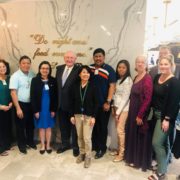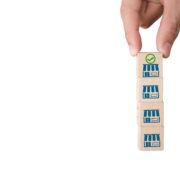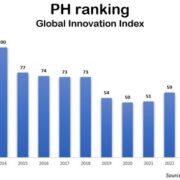
Washington, DC — “The US Government has confirmed that young coconuts from the Philippines may now be exported through all ports in the USA,” the Philippine Agriculture Attaché to the United States Dr. Josyline Javelosa reported.
Dr. Javelosa joined the bilateral meeting on May 22-23, 2019 between Plant Health Officers of the Philippines and the United States at the United States Department Agriculture’s Animal and Plant Health and Inspection Service (USDA-APHIS) headquarters at Riverdale, Maryland.
In the meeting, Dr. Jill Wallace, Head of the US delegation and Deputy Director of Phytosanitary Issues Management (PIM), confirmed that young coconuts from the Philippines that are immature/green, and with 75 percent or more of outer shell surface of the husk removed, can be inspected and released to the United States as authorized under 7 CFR 319.56.

Head of the Philippine Delegation and Department of Agriculture’s Bureau of Plant Industry (BPI) director George Culaste welcomed this development, and cited the Philippine young coconut producers, especially in Mindanao, who are waiting to tap export markets such as the United States and China.
Other issues discussed include the Philippine request for the access of its:
1) Okra to the U.S. market;
2) Philippine proposal to have the US waive pre-clearance requirements for Philippine fresh mango exports;
3) US request for its blueberries to access the Philippine market;
4) The two countries’ respective initiatives with regard to Export Certification and Electronic Phytosanitary Certificates and observance of the 2020 International Year of Plant Health.
USDA-APHIS also took the opportunity to host site-visits for the meeting participants to their impressive facilities, such as the APHIS Plant Germplasm Inspection Station and Quarantine Program in Beltsville, Maryland and the APHIS National Identification Services for plant pests in both the USDA-Agricultural Research Service building in Beltsville, Maryland and at the Smithsonian National Museum of Natural History in Washington D.C.
APHIS Deputy Administrator Osama El-Lissy hosted the exit meeting of both delegations at USDA’s Whitten Building and affirmed his support for the resolution of the bilateral phytosanitary issues between the Philippines and the United States.
USDA Agriculture Secretary Sonny Perdue also had the chance to briefly visit with the meeting participants and highlighted the importance of trade between the U.S. and the Philippines.
“I congratulate the participants for covering a lot of ground in their bilateral meeting. These positive developments bode well for the expansion of Philippines-US agriculture cooperation and creation of opportunities for Filipino and American farmers and agri-businesses,” said Philippine Ambassador to the U.S. Jose Manuel G. Romualdez in a statement.
—
Stay updated with news and information from the Department of Foreign Affairs by visiting their website at www.washingtonpe.dfa.gov.ph,
www.philippineembassyusa.org, https://www.facebook.com/PHinUSA or https://twitter.com/philippinesusa.






